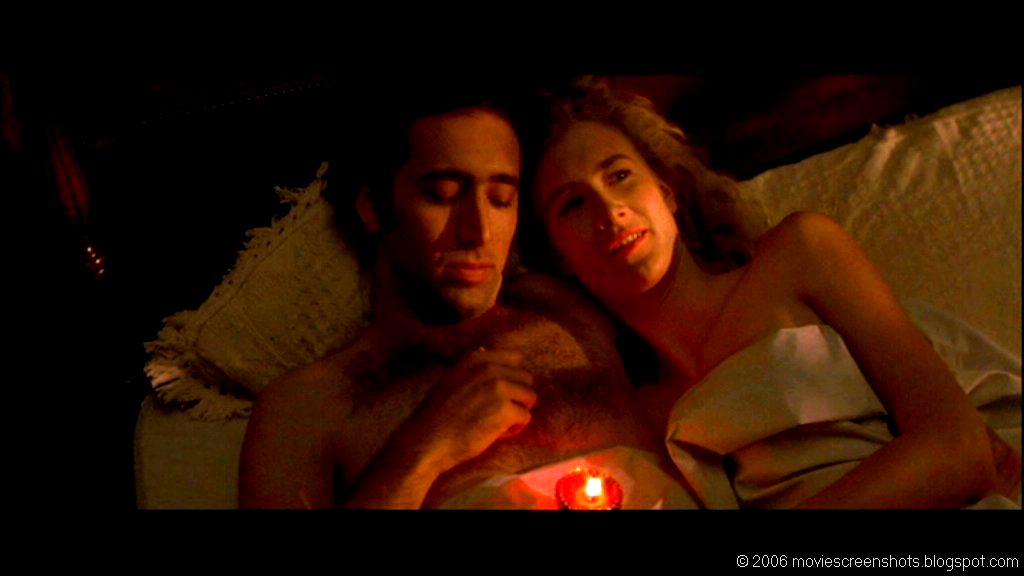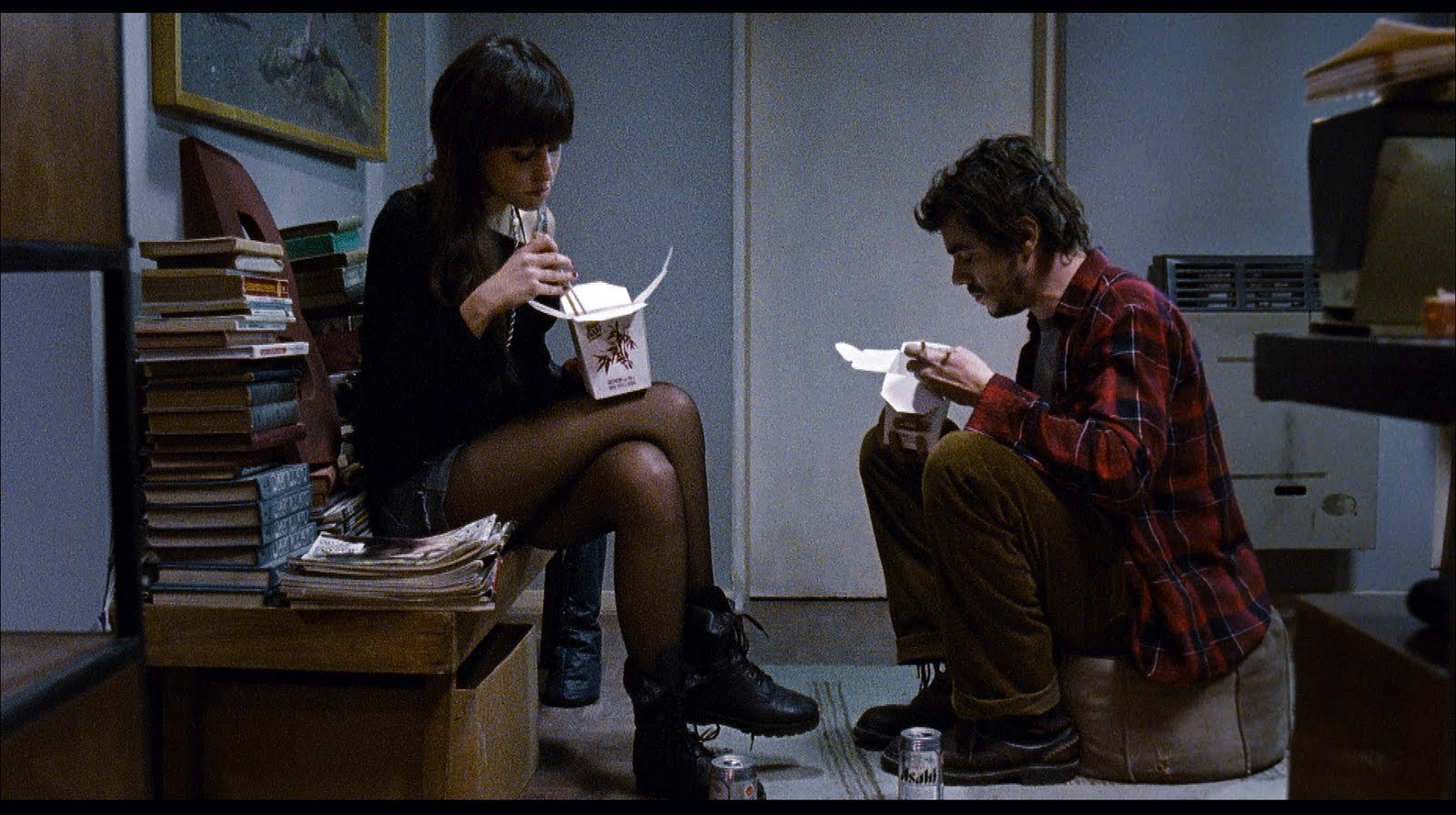
Well lovers the big day is here once again! Just a couple of disclaimers before I dive into this post. Firstly, I AM NOT A UNSENTIMENTAL GUY WHO IS ANTI-LOVE OR ROMANCE. I AM ROMANTIC GUY, ITS JUST I DON'T BELIEVE THAT YOU SHOULD PICK ONE DAY OUT OF THE YEAR TO TREAT YOUR LOVED ONES JUST TO SUIT A HOLIDAY! ALSO THIS IS NOT A LIST ATTACKING VALENTINES DAY, JUST SHOWING AN ALTERNATIVE TO IT!
So whether you are single, or just someone who has no interest in Valentines Day here is are my suggestions for alternative Valentines Day films. Please note each choice will have some connection to romance or at least feature a relationship of sorts, but approaches it from a different angle. Listed in order of release dates.
BRINGING UP BABY (1938)
Katharine Hepburn is at her witty, spontaneous best in Howard Hawk's bizarre twist on the screwball rom-com. Hepburn stars as a ditzy heiress who makes Cary Grant's Zoology professor's life hell through a series of madcap mishaps, the worse of which is when she loses his pet leopard (the baby of the title). The script is full of sharp one liners, the exchanges between the leads are thriller, and there's some inventive knock about humour. Hawks does a skilled job with the direction, but it is the twisted and fun plot, plus how Hepburn's character slowly wins over David and the audience which is what makes the ride so worthwhile. In the hands of a lesser actress Hepburn's character would have been so throw away and annoying. Here she's a delightful ball of energy!
A MATTER OF LIFE AND DEATH (1946)
Another true original from master filmmakers Micheal Powell and Emeric Pressburger. The idea has been copied many times since, but has never been given such a fresh and thrilling lease of life. David Niven's RAF pilot is on the verge of losing his life, having told his crew to leave the nest, sadly for him his parachute has been shot out by the enemy. During what he believes is the end, he connects with Kim Hunter's Radio operator in a touching scene. So that's the end of their brief romance right? Well, not quite. In a surreal twist the pilot is given a second chance to live due to a administrative error in heaven. The rest of the film is divided between the real world and heaven, and a struggle to decide if the pilot should accept his fate and pass on over to the other side, or if he deserves another shot at life. The film uniquely blends the genres of Sci-Fi, war film, romance and surreal comedy, and is one of the most beautiful, and poetic cinematic experiences of all time.
JOURNEY TO ITALY (1954)
Married British couple Katherine and Alex Joyce (Ingrid Bergman and George Sanders) are perfectly happy, until a holiday to Italy brings to the surface all the problems which have been bubbling underneath. Roberto Rosselini's fluid film, is a beautifully straight forward narrative comedy of errors, with Sanders and Bergman perfectly cast because of her buttoned up their characters are, and yet her naturally the sparks fly between them. Though the film is very funny and beautiful to watch, it also sharply draws out some of the pitfalls of marriages that just are not meant to be. Then again there is also a hint that maybe Katherine and Alex ae truly meant for each other, as no one else could stand to be with either one of them.
THE APARTMENT (1960)
Often for a romance to truly endure and to have the desired impact come the end of the picture, then there has to be a sense of struggle for the characters along the way. Indeed, at times it must appear as if as if romance is the least likely outcome between them. In Billy Wilder's timeless New York set satire, the viewer is presented with the classic underdog story, as down trodden office employee CC Baxter (Jack Lemmon) is trapped in a thankless job and life serving the needs of his heartless boss, this includes giving up his apartment for him to meet with women. Things take a complicated turn when one of these women turn out to be the elevator operator from Baxter's work place (Shirley MacLaine) who Baxter has taken a liking to. This is the anti-romantic comedy for a number of reasons, firstly because the lead characters are not reduced to the standard gender stereotypes typically linked the genre. Baxter is a charming, but nervous old fashioned soul, with a sense of morality and depth who is trapped inside a role by the cynically cold masculine work place of the 60s setting (which Wilder is clearly critical of), while MacLaine's Fran is a more assured, witty and confident female presence with her own set of complexities which bleakly manifest themselves later in the film. The slow burning plot and growth of the characters make it the film a rich but unconventional experience and in turn, Baxter and Fran most craw their way out of the gutter in order to find their true selves and find love. And of course it ends with one of the greatest final lines in cinema history.
Harold and Maude (1971)
From a black comedy turn romance, to something a altogether more twisted and left field. Hal Ashby's cult classic follows young Harold (Bud Cort) whose fascination with death distances him further from his up tight Mother (Vivian Pickles) and into a oddball relationship with 79 year old Maude played with true vim by Ruth Gordon. Though defining logic in their relationship, the film perfectly engages you within the twisted logic of Harold and Maude's surreal world, and is both playfully funny with its off kilter black comedy, but also oddly gentle at times. Its like a darker and more unconventional version of the Bonnie and Clyde story, with some of the most inventive set pieces of 70s cinema.
SCENES FROM A MARRIAGE (1973)
Like the earlier Rossellini film, this offering from Swedish auteur Ingmar Bergman centers around the falling apart of a marriage. However, the approach is very different here. Adapted from a six-part television series that originally aired on Swedish televison, Scenes from a Marriage follows in the traditions of the claustrophobic chamber pieces, with much of the tension a raising from the interactions between the leads in condensed spaces. Liv Ullman and Erland Josephsom give perfectly judged, and subtly built up organic performances. The pacing achieves the dramatic ebb and flow of a draining stage play, yet it is vividly framed, and given energy, but just the right level of restraint from Bergman. Part of the power of the film comes from its episodic structure. Each encounter is treated like a distinct min-film or chapter all of its own, thus having the effect of building up the dramatic tension, with each passing chapter all the more devastating because of the scary reality of how each one is going to end.
WILD AT HEART (1990)

David Lynch's wildly fun, dark and ambitious road movie explored the themes of extreme violence and sex with the lines often blurred in a similar fashion to Blue Velvet (1986). Except, this time the director constructs the story as a straight forward narrative, influenced by dark fairy tale logic of The Wizard of Oz. Despite this in many ways I consider WAH to be one of Lynch's most humanistic films. In a sense Lynch's film says that life moves in the straight forward direction of the road that the leads travel down, but that there will always be challenges ahead of us, but that ultimately our destinies are effected by the sprit second decisions we make. That is certainly true of Nicolas Cage's Sailor Ripley, a rugged, criminal who is attempting to go straight with the love of his life Lula Fortune (Laura Dern) who is on the run with Sailor from her vicious mother (the Wicked Witch of West of the piece played by Dern's real life mother Diane Ladd). As Sailor Cage gives one of the edgiest performances of his career. The character is partly styled on Elvis (in a nod to Lynch's love of rockerbilly), and produces charismatic versions of two Elvis songs during the film. It is contrast between these random performances and the madness going on around them that make Wild at Heart such a different experience than any other love story you are likely to view. Sailor and Lula make for a fine screen couple, and the film is full of some of the most disturbing characters to ever appear in a Lynch film.
BRIDE OF CHUCKY (1998)
Inspired by hammer classic Bride of Frankenstein (1935) the fourth part of the Child Play's series is by some distance the best. It gives a fresh post-modern twist to a series that had gone stale. As well as a smart satire on the history of the slasher flick, Ronny Yu's film is also a welcome return to the thrill of the Friday night popcorn movie. In that sense it joyfully ticks of the genre boxes, its fast paced, stylish, has slick dialogue, it is funny, thrilling, scary, and yes in places even romantic. There is the lovely fresh faced love of young couple Jade (Katherine Heigi, here proving that she is much better than her film output since suggests), and Jesse (Nick Stabile), contrasted with the evil Bonnie and Clyde style romance between living dolls Chucky (Brad Dourif) and Tiffany (Jennifer Tilly on wild form). If this isn't enough for you, it features one of the most romantic lines ever, during the scene where Chucky and Tiffany are getting intimate, Chucky comments, "I don't know about you, but I'm starting to feel like Pinocchio". What more could a woman want?
LOST IN TRANSLATION
Sofia Coppola's follow-up to The Virgin Suicides (1999), is all about fragmented communication
as result of the time and space created in the fast moving big city life of modern times. It is the very human story of two people, a washed up actor (Bill Murray) and a post-graduate (Scarlett Johansson), both at very different stages in their lives, and yet, both connected by their alienation and lack of direction. The film is of course unique because of its resistance to make this central relationship into a romantic one. Instead what we get is one of the most delicate, and charming father-daughter relationships ever produced on screen. Not just is the Japanese setting of the film a visual feast, but it serves as the perfect back drop for the character's lives to slowly unfold. At times it is the mood of their interactions, and what isn't said that produces the most vivid moments. From this point of view it is fitting that the film ends with a scene where the mind is left to wonder just what was said.
Eternal Sunshine of the Spotless Mind (2004)
Michel Gondry's films takes the concept of a broken romance where one of the parties decides to try a radical new treatment to erase any memory of their relationship, into a cinematically rich, surreal, and challenging experience, tackling a vast range of themes along the way. Not only is this an anti-Hollywood rom-com, but for those who are used to seeing Jim Carry's rubbery comic hi-jinks, then here is Carry successfully reinvents himself, as a down trodden loner. Kate Winslett is bundle of energy, with her character's many different moods represented in her range of hair colours and clothing choices. There is a superb supporting cast too, including Tom Wilkinson, Kirsten Dunst, Jane Adams and David Cross. At its core this is a film celebrating the endless possibilties of cinema, and of storytelling itself.
Alexandre Aja's debut horror movie marked him out as a fresh and exciting talent. The set up is a very common one, with best friends Marie (Cecile de France) and Alexia (Maiwenn) taking a break from city life and escaping to a relatives country house. Their lives are suddenly turned upside when a mysterious stranger (a terrifying Philippe Nahon) shows up and lays siege to the farmhouse targeting the family and the two girls. Slaughtering Alexias family, the stranger then kidnaps the young girl with Marie desparatley attempting to rescue her friend. Aja brings a distinct craft to this typical horror movie set up. The pacing is subtle, and the slow build up of tension really pays off in the film's set pieces. Aja has a rich visual sensibility and invests his central relationship with plenty of passion, and depth. These are far from the generic scream queens that are so often found in horror cinema, and they are played with conviction by Maiwenn and de France. There is a twist which I won't reveal here, but which for me might be the only misstep in the film. Though when you see how it plays out chances are you will appreciate the craft of the proceeding ninety minutes even more.
Medianeras (2011)
 This quirky black comedy was the highlight for me of my viewings at the 2011 Berlin film festival. It takes two lost oddballs, with a random, but unknown connection, and traces their separate lives up until their eventual meeting. Stylistically, the film blends elements of the social satires of Pedro Almodovar, the sharp wit of classic Woody Allen, and the surreal darkness of Charlie Kaufman. Its another character driven film, with two wonderful performances from Javier Drolas and Pilar Lopez de Ayala. Its a compassionate human drama, with engaging leads put through their paces. Though it often doesn't feel like a romantic story, it ends with one of most truly up lifting, funny and touching scenes I've seen in many a year. And there's a subplot featuring Where's Wally. Yes this is a very different romantic comedy indeed.
This quirky black comedy was the highlight for me of my viewings at the 2011 Berlin film festival. It takes two lost oddballs, with a random, but unknown connection, and traces their separate lives up until their eventual meeting. Stylistically, the film blends elements of the social satires of Pedro Almodovar, the sharp wit of classic Woody Allen, and the surreal darkness of Charlie Kaufman. Its another character driven film, with two wonderful performances from Javier Drolas and Pilar Lopez de Ayala. Its a compassionate human drama, with engaging leads put through their paces. Though it often doesn't feel like a romantic story, it ends with one of most truly up lifting, funny and touching scenes I've seen in many a year. And there's a subplot featuring Where's Wally. Yes this is a very different romantic comedy indeed. So those are my choices for alternative rom-coms. Please leave your comments and own suggestions.
Keith Beard.
I've only seen Bride of Chucky. Lol. I'd recommend my favorite romantic movie He's Just Not That Into You. Lol. Absolutely not that terrible Valentines Day movie. Although Valentine with David Boreanaz is a pretty bad but enjoyable horror movie. Lol
ReplyDeleteSeen bits of HJNTIY. Looked pretty bad lol. But that's not point of this post. I have no issues with romantic comedies when they are good. These are just alternatives to them.
ReplyDelete